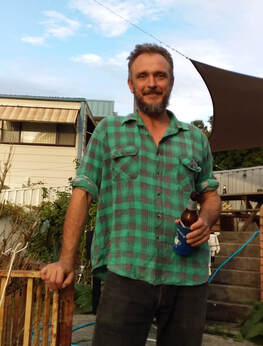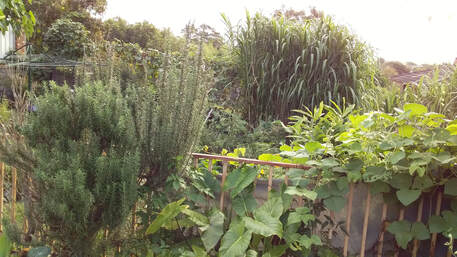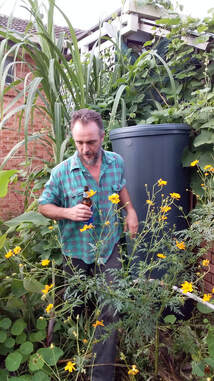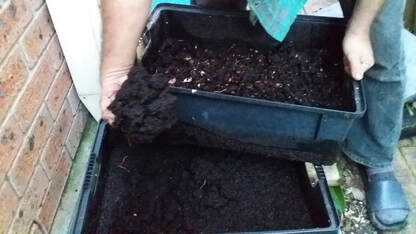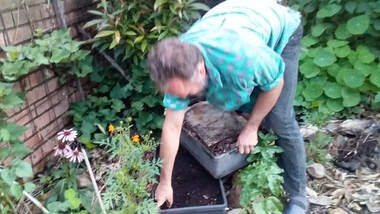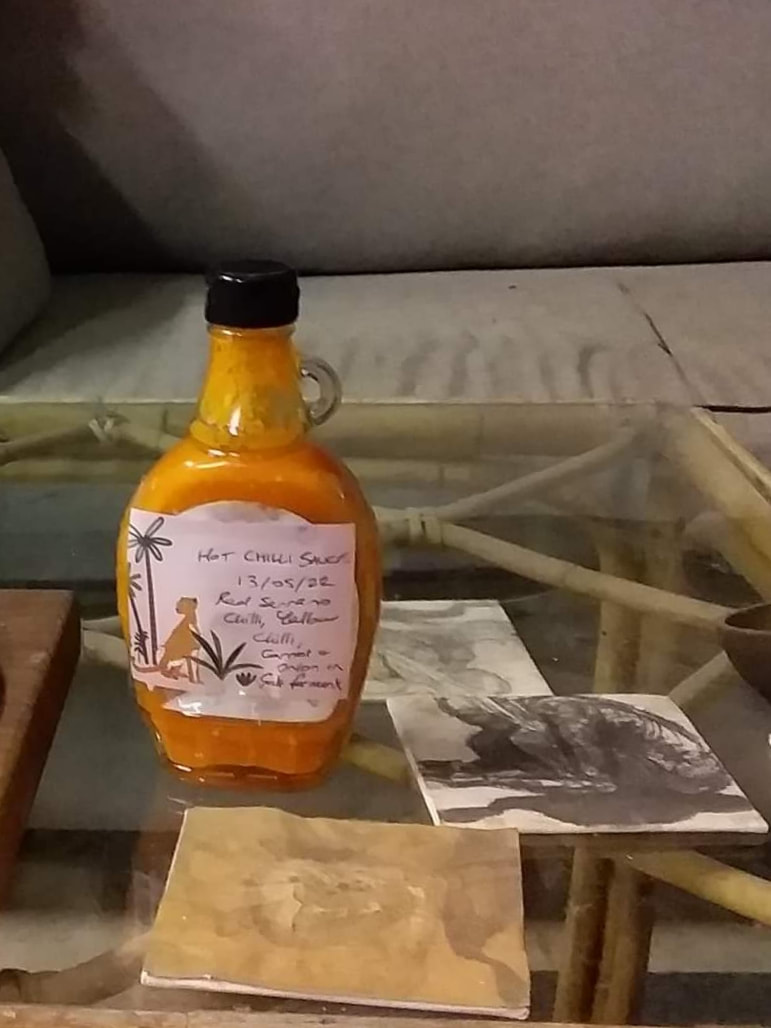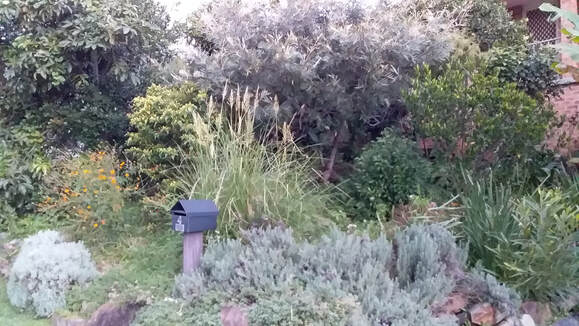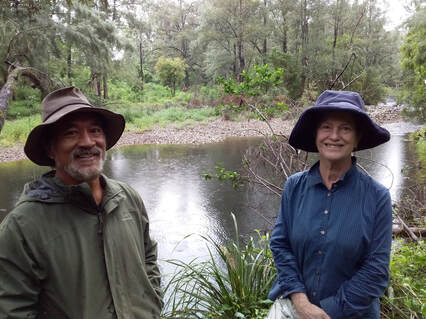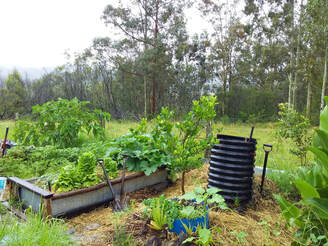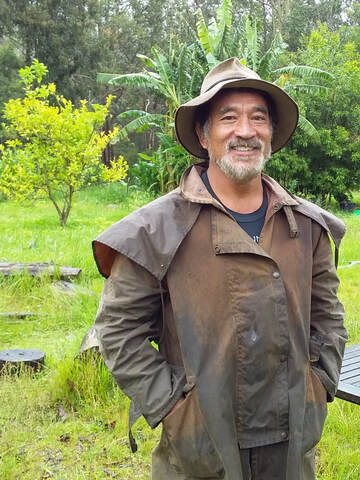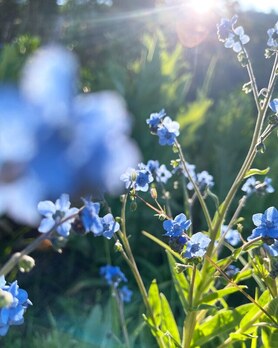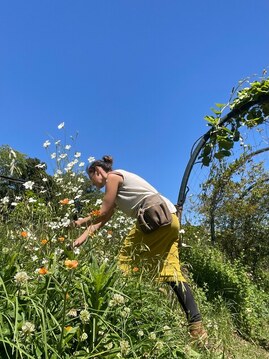Local Midcoast growers in the spotlight (scroll down):
- Joël Dunn, Forster
- Jack Thieme, Black Bulga
- Manning Valley Flower Collective
Joël Dunn, Forster
|
Joël lives in a lovely, hilly part of Forster and has done tremendous things with the garden around his family’s home. On a sundowner visit in May 2022, I had a good look around his lush garden, and gained insights on getting the best out of a relatively small plot of land. It was an eye-opener!
Garden design The two main things that influenced Joël’s garden design were the slope (quite steep) and the aspect. When they first arrived, it was all mainly lawn, which was kept for a while and reclaimed in stages, starting with the steep slope at the front of the house. |
Reclamation was done with sheet mulching, using materials scavenged from around town - fruit and veg scraps from the local fruit shop, cardboard boxes from appliance stores and so on - as well as getting some wood chips from a friend who is a tree lopper. Joël used sugar cane mulch as a top-up mulch in the early days, but he’s lately been using cut and chopped up bana grass, which he grows as a windbreak on the western boundary fence.
Well into his second decade with the garden, Joël has a new design idea - to have perennial plants in north-south rows on both sides of the main plot of land, arranged in typical wind-break fashion with three closely-planted rows arranged according to plant height - medium, tall, medium. This would provide a protected and less shaded spot in the middle for the annuals. This is inspired by ‘syntropic farming’, a regenerative agricultural cropping method developed in Brazil that aims to mimic the way forest plants work symbiotically to grow in abundance (see https://www.abc.net.au/news/rural/2018-07-13/syntropic-farming-food-forests-take-root-in-australia/9986016). Joël believes that the principle can be applied also in small gardens since, as he put it, it could help to ‘turn your garden into a macro-organism’. In such a system, nothing is wasted, for example, on a regular basis, pruning plants just when they’re starting to flower and the bana grass just before it becomes woody, and putting all of these clippings straight back into the garden beds.
|
A key part of the garden’s design is a grey water swale-cum-mulch pit that is on the contour. The water is channeled from a tank alongside the house. The idea with this is that you’ve got carbon and fungus rich compost that treats the grey water. You keep on adding material and ‘when it’s going, it’s full of compost, then the idea is to take it out and start again’. This is all part of Joël’s integrated fertilisation system.
Fertilising the garden Besides the compost, fertilisation for the garden comes from three different kinds of worm farm: |
|
Stackable, with proper-fitting lid: By the time it’s done, the material in the bottom layer has become a really, really rich compost. Everything from the kitchen goes in, with the idea to give the worms a balanced diet: ‘If it is smelly, it’s usually because it’s too wet and too acid, so add brown things and calcium’, Joël added. ‘When the compost worms are getting too abundant, I scoop a handful out and put them in the garden where there’s plenty of mulch’, he said doing exactly that. This worm farm has open drainage with leachate collection underneath it for use on the garden, so plenty of liquid can be added without flooding the worms.
|
Solid-bottomed, contained: just add a balanced variety of plant matter and scraps from the kitchen but avoiding liquids like teapot rinsings so it doesn’t become too wet. Scoop it out from the bottom for the worm castings. ‘
Worm farm in situ: a third worm farm is placed straight onto a garden bed and the castings from below spread onto the bed, as well as being available for use elsewhere in the garden. ‘Mixed with river sand and coconut fibre, the worm castings make an excellent propagation mix. Oh, and for seed raising, just use the river sand and coconut fibre’, Joël advised.
Worm farm in situ: a third worm farm is placed straight onto a garden bed and the castings from below spread onto the bed, as well as being available for use elsewhere in the garden. ‘Mixed with river sand and coconut fibre, the worm castings make an excellent propagation mix. Oh, and for seed raising, just use the river sand and coconut fibre’, Joël advised.
Growers with small gardens could also pay attention to minerals in the soil, and what could possibly be added. Crunched up oyster shells can be added to the worm farms - ‘worms love it’.
Joël also suggested that coastal gardeners could use a bit more copper foliar sprays where there are black spot and mildew issues. Fungus hates copper, which tends to be a bit deficient in high rainfall coastal soils. Since boron also leaches easily, but is important in plant mineral metabolism, tiny amounts of Borax can be added to the soil or compost. Nitrogen is essential. There are various ways to source this, including from diluted urine, however, too much nitrogen can reduce the calcium available to plants and can lead to too high levels of nitrates in spinach, for example.
The family also used to have chooks, housed in a mobile coop that could be kept in a spot for a while - ‘If you have four beds, you can do this over a three month cycle, good for phosphorus’. Chooks need to be well protected, foxes are a constant threat in Forster. The family no longer keeps chooks for this reason, the foxes make them hard to look after during holidays and times away.
Other locally available fertilisers include seaweed - ‘rinse the salt off. It ferments into a powerful fertiliser’ - and harvested azolla from the nearby constructed wetland, which makes an excellent compost ingredient. The lesson seems to be: no matter where in the region you are or how small your garden, you can take advantage of what is there, scavenge and share with friends and others.
Joël also suggested that coastal gardeners could use a bit more copper foliar sprays where there are black spot and mildew issues. Fungus hates copper, which tends to be a bit deficient in high rainfall coastal soils. Since boron also leaches easily, but is important in plant mineral metabolism, tiny amounts of Borax can be added to the soil or compost. Nitrogen is essential. There are various ways to source this, including from diluted urine, however, too much nitrogen can reduce the calcium available to plants and can lead to too high levels of nitrates in spinach, for example.
The family also used to have chooks, housed in a mobile coop that could be kept in a spot for a while - ‘If you have four beds, you can do this over a three month cycle, good for phosphorus’. Chooks need to be well protected, foxes are a constant threat in Forster. The family no longer keeps chooks for this reason, the foxes make them hard to look after during holidays and times away.
Other locally available fertilisers include seaweed - ‘rinse the salt off. It ferments into a powerful fertiliser’ - and harvested azolla from the nearby constructed wetland, which makes an excellent compost ingredient. The lesson seems to be: no matter where in the region you are or how small your garden, you can take advantage of what is there, scavenge and share with friends and others.
|
What to grow
Over the years, the garden plantings have gone through several combinations of annuals and perennials, edibles and non-edibles but the fruit trees have been a stable constant. The bananas and passion fruit are doing well.
Joël noted that, since his partner has been making soaps and perfumes incorporating home grown and local botanical ingredients, they’ve been adding more colour and aroma into the garden. Surplus food is turned into preserves and shared with friends, for example this hot chilli sauce (pictured) with the red serrano and yellow chillies growing in the garden. |
Weeds require constant attention, but they can also be useful. The main weeds Joël has had to deal with are kikuyu, couch grass and native Commelina (scurvy weed). The latter has a blue flower and spreads very quickly, so it’s a good idea to keep on top of it in the garden, but it’s edible, a very beneficial groundcover in the bush, and chooks love it. He also noted that rapidly growing kikuyu lawn areas are a great source of fine mulch with a little help from the mower.
The front garden
While most of the action happens in the back garden, the family has not neglected the front. Full advantage was taken of the steep slope to create a stunning setting for the house. Hidden within the lush mix of shrubs, small trees and grasses are pot plants which had been nurtured by the daughter who’s now at uni. Small gardens in town have that thing about them - every corner contains memories, every plant a story.
While most of the action happens in the back garden, the family has not neglected the front. Full advantage was taken of the steep slope to create a stunning setting for the house. Hidden within the lush mix of shrubs, small trees and grasses are pot plants which had been nurtured by the daughter who’s now at uni. Small gardens in town have that thing about them - every corner contains memories, every plant a story.
Jack thieme, Black Bulga
Network member Jack Thieme is a local grower with a large canvas to work on. We visited him at his home in the Upper Monkerai Valley, near the Black Bulga State Conservation Area (SCA). Jack is a member of, and main gardener at, Black Bulga, a small intentional community striving to live in harmony with nature and with each other, and to tread lightly on the earth (https://www.ic.org/directory/black-bulga/).
In 2010, the community purchased a block of land at the confluence of the Karuah and Teleghery rivers on Worimi land. As they write: Something about the sweet taste of the river water, the cool, deep swimming holes, stunning views and fertile soil made it easy for our group to realise that we had finally found the place we had been looking for.
In 2010, the community purchased a block of land at the confluence of the Karuah and Teleghery rivers on Worimi land. As they write: Something about the sweet taste of the river water, the cool, deep swimming holes, stunning views and fertile soil made it easy for our group to realise that we had finally found the place we had been looking for.
The community, which had come together through environmental activist networks in Newcastle, had a desire to develop a level of self-sufficiency on Black Bulga. Having studied horticulture, and with an interest in permaculture, Jack is spearheading the development of the garden. When asked what he feels about growing, Jack replied:
To grow stuff, that’s what I was meant to do. When I feel at my best is when I’m losing myself in the garden. There’s a sense of self-empowerment in growing your own food.
To grow stuff, that’s what I was meant to do. When I feel at my best is when I’m losing myself in the garden. There’s a sense of self-empowerment in growing your own food.
|
A standout feature of the large vegetable growing area is its mixed plantings and healthy plants. Jack adopts water wise and soil enhancing techniques such as raised beds, mounds (great for potatoes!), mulching, inter-cropping, and use of filtered grey water.
On the periphery, towards the large stands of eucalypt forest, he plants - with fire protection in mind - bananas, plantains, coffee shrubs and native rainforest species such as Native Frangipani, Sandpaper Figs, Turpentine, Cheese tree (Glochidian ferdinandi), and other rainforest species. |
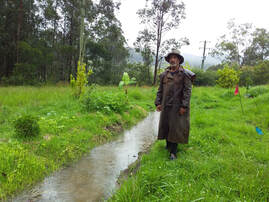
Jack has a vision to create a food forest, and the swale system he’s constructed is a key part of the design. We visited him on a rainy day, and the swale was highly effective in channeling and holding onto the water exactly where he wanted it to be, with plantings of trees, including fruit trees, all around it.
Jack shared his views on people developing local resilience and a level of self-sufficiency, and said that he was part of a group of men from the area focusing on this very issue. They would get together to share ideas and techniques in crafts such as brewing and the curing of meat.
A key challenge for growers who are not in favour of huge scale, consolidated, mechanised methods, he noted, was to work out the ideal scale that makes the effort into growing a range of crops worthwhile. How can you get to make some kind of income from growing by using organic methods and permaculture garden design, not on a huge scale, but still large enough to get a decent income?
He believes that working together with like-minded people, and finding ways to process the produce locally, such as through brewing or curing, would be ways in which to make smaller-scale growing worthwhile.
A key challenge for growers who are not in favour of huge scale, consolidated, mechanised methods, he noted, was to work out the ideal scale that makes the effort into growing a range of crops worthwhile. How can you get to make some kind of income from growing by using organic methods and permaculture garden design, not on a huge scale, but still large enough to get a decent income?
He believes that working together with like-minded people, and finding ways to process the produce locally, such as through brewing or curing, would be ways in which to make smaller-scale growing worthwhile.
Jack didn't feel that marketing was a particular problem, but noted that growers working together certainly helps. He was very happy to join Midcoast Growers Network, since it is in keeping with the kinds of thinking that he has.
We are thrilled to have you on board, Jack, and look forward to seeing how your garden at Black Bulga develops. Thanks for a very pleasant visit. (Ron and Stef)
We are thrilled to have you on board, Jack, and look forward to seeing how your garden at Black Bulga develops. Thanks for a very pleasant visit. (Ron and Stef)
Manning Valley Flower Collective
The Manning Valley Flower Collective is a group of flower growers and florists from our region who are looking to connect with other growers and designers, share knowledge and insights, and create a community of like-minded flower folk who value collaboration over competition. Network member Rachel Falla shares their story.
Our members range from small scale flower growers, studio florists and floral creatives. We live in such a beautiful part of the world - from the rivers to the oceans, to the mountains to the towns, and there is so much that can be grown here and IS being grown here.
A shift has begun around Australia with an emphasis on grown not flown local flowers. Flowers are ephemeral and shine in their place, in their season and time. This growing awareness around the impacts of imported flowers is resulting in vibrant flower growing communities popping up around the country.
The benefits of being an active part of the Collective are the opportunities for collaboration and connections. We organise gatherings where we discuss all manner of flower growing and the 'business of flowers' topics - from what seeds we are sowing now, to the price of flowers, to education, what inspires us, and everything in-between. We've also had seed swaps and shared bulk seed and plug orders as many of our members are small scale growers and wholesale orders are generally too large.
A shift has begun around Australia with an emphasis on grown not flown local flowers. Flowers are ephemeral and shine in their place, in their season and time. This growing awareness around the impacts of imported flowers is resulting in vibrant flower growing communities popping up around the country.
The benefits of being an active part of the Collective are the opportunities for collaboration and connections. We organise gatherings where we discuss all manner of flower growing and the 'business of flowers' topics - from what seeds we are sowing now, to the price of flowers, to education, what inspires us, and everything in-between. We've also had seed swaps and shared bulk seed and plug orders as many of our members are small scale growers and wholesale orders are generally too large.
|
Most importantly, the connections and friendships made have been the most beneficial and joyful part of it all. In this time of the COVID pandemic, we are looking forward to the world opening up and allowing us to gather and drink tea and talk flowers again in person.
Some of our members include Broula Farm, The Little Orange Farm, Dogswood Botanical, Flora Adora Studio, Rose Myrtle Farm, Tranquil Garden Nursery, Blooms With A View, Arcadia Flower Farm, and Hello Posy Co. |
We welcome all MidCoast growers, no matter the scale or experience, who are interested in growing for cut flowers or if you are a florist looking to connect with our growers and to design with locally grown flowers where possible.
The world always needs more people growing flowers!
The world always needs more people growing flowers!
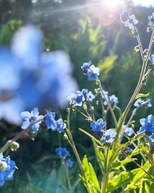 Photo: Rachel Falla
Photo: Rachel Falla
Find us on
Instagram @manningvalleyflowercollective
or join our private Facebook group of the same name
Find us on
Instagram @manningvalleyflowercollective
or join our private Facebook group of the same name

